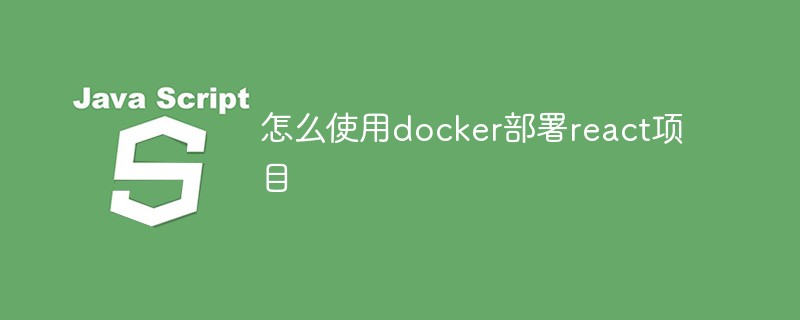Home >Web Front-end >Front-end Q&A >How to use docker to deploy react projects
How to use docker to deploy react projects
- 藏色散人Original
- 2022-12-28 09:59:013206browse
How to use docker to deploy react projects: 1. Pull the nginx image through "docker pull nginx"; 2. Check whether the pull is successful; 3. Use "docker run --name reactweb -p 8088:80 -d nginx" to create and start an nginx container; 4. Modify the nginx information and copy the local files to the docker image.

The operating environment of this tutorial: Windows 10 system, react18.0.0 version, Dell G3 computer.
How to use docker to deploy react projects?
Teach you step by step how to deploy a react project in docker (deploy nginx in docker)
1. Pull the nginx image
docker pull nginx
2. Check whether the pull is successful
docker images
3. Create and start an nginx container
docker run --name reactweb -p 8088:80 -d nginx
-name: Name the newly created container, here is: reactweb
-p: Port mapping, put the host The 8088 port is mapped to the 80 port of the container, that is, the last access to localhost:8088
-d: After successful startup, output the complete container ID
nginx: Mirror name
At this time, you can test whether nginx appears when accessing localhost:8088
3.1. Enter the MySQL container
docker exec -it reactweb sh
4. You may need to modify the nginx information and use vim
apt-get update apt-get install vim
5. Copy local files to the docker image
docker cp local address container id:nginx mapping address
local address:/Application/code/build
container id:docker ps -a To view the
nginx mapping address, you can enter the container and then view the default.conf in /etc/nginx/conf.d. The default is usr/share/nginx/html
6. If You need to modify the nginx conf
cd /etc/nginx/conf.d vim default.conf // 编辑完保存后 重启nginx nginx -s reload
You can access it locally
Recommended learning: "react video tutorial"
The above is the detailed content of How to use docker to deploy react projects. For more information, please follow other related articles on the PHP Chinese website!

